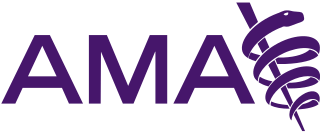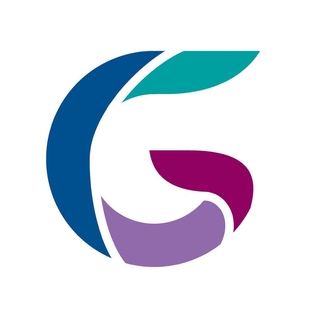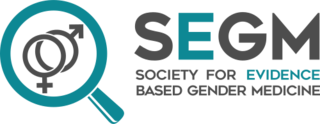Gender dysphoria (GD) is the distress a person experiences due to a mismatch between their gender identity—their personal sense of their own gender—and their sex assigned at birth. The term replaced the previous diagnostic label of gender identity disorder (GID) in 2013 with the release of the diagnostic manual DSM-5. The condition was renamed to remove the stigma associated with the term disorder. The International Classification of Diseases uses the term gender incongruence instead of gender dysphoria, defined as a marked and persistent mismatch between gender identity and assigned gender, regardless of distress or impairment.
Gender-affirming surgery (GAS) is a surgical procedure, or series of procedures, that alters a person's physical appearance and sexual characteristics to resemble those associated with their identified gender. The phrase is most often associated with transgender health care and intersex medical interventions, though many such treatments are also pursued by cisgender and non-intersex persons. It is also known as sex reassignment surgery (SRS), gender confirmation surgery (GCS), and several other names.

The Intersex Society of North America (ISNA) was a non-profit advocacy group founded in 1993 by Cheryl Chase to end shame, secrecy, and unnecessary genital surgeries on intersex people. Other notable members included Morgan Holmes, Max Beck, Howard (Tiger) Devore, Esther Morris Leidolf and Alice Dreger. The organization closed in June 2008, and has been succeeded by a number of health, civil and human rights organizations including interACT.

Non-binary and genderqueer are umbrella terms for gender identities that are outside the male/female gender binary. Non-binary identities often fall under the transgender umbrella since non-binary people typically identify with a gender that is different from the sex assigned to them at birth, although some non-binary people do not consider themselves transgender.

The American Medical Association (AMA) is an American professional association and lobbying group of physicians and medical students. Founded in 1847, it is headquartered in Chicago, Illinois. Membership was 271,660 in 2022.
The Endocrine Society is a professional, international medical organization in the field of endocrinology and metabolism, founded in 1916 as The Association for the Study of Internal Secretions. The official name of the organization was changed to the Endocrine Society on January 1, 1952. It is a leading organization in the field and publishes four leading journals. It has more than 18,000 members from over 120 countries in medicine, molecular and cellular biology, biochemistry, physiology, genetics, immunology, education, industry, and allied health. The Society's mission is: "to advance excellence in endocrinology and promote its essential and integrative role in scientific discovery, medical practice, and human health."
Various issues in medicine relate to lesbian, gay, bisexual, transgender and queer (LGBTQ) people. According to the US Gay and Lesbian Medical Association (GLMA), besides HIV/AIDS, issues related to LGBTQ health include breast and cervical cancer, hepatitis, mental health, substance use disorders, alcohol use, tobacco use, depression, access to care for transgender persons, issues surrounding marriage and family recognition, conversion therapy, refusal clause legislation, and laws that are intended to "immunize health care professionals from liability for discriminating against persons of whom they disapprove."
In the United States, the rights of transgender people vary considerably by jurisdiction. In recent decades, there has been an expansion of federal, state, and local laws and rulings to protect transgender Americans; however, many rights remain unprotected, and some rights are being eroded. Since 2020, there has been a national movement by conservative/right-wing politicians and organizations to target transgender rights. There has been a steady increase in the number of anti-transgender bills introduced each year, especially in Republican-led states.

Lesbian, gay, bisexual, and transgender (LGBTQ) people in the U.S. state of Florida have federal protections, but many face legal difficulties on the state level that are not experienced by non-LGBT residents. Same-sex sexual activity became legal in the state after the U.S. Supreme Court's decision in Lawrence v. Texas on June 26, 2003, although the state legislature has not repealed its sodomy law. Same-sex marriage has been legal in the state since January 6, 2015. Discrimination on account of sexual orientation and gender identity in employment, housing and public accommodations is outlawed following the U.S. Supreme Court's ruling in Bostock v. Clayton County. In addition, several cities and counties, comprising about 55 percent of Florida's population, have enacted anti-discrimination ordinances. These include Jacksonville, Miami, Tampa, Orlando, St. Petersburg, Tallahassee and West Palm Beach, among others. Conversion therapy is also banned in a number of cities in the state, mainly in the Miami metropolitan area, but has been struck down by the 11th Circuit Court of Appeals. In September 2023, Lake Worth Beach, Florida became an official "LGBT sanctuary city" to protect and defend LGBT rights.
Puberty blockers are medicines used to postpone puberty in children. The most commonly used puberty blockers are gonadotropin-releasing hormone (GnRH) agonists, which suppress the natural production of sex hormones, such as androgens and estrogens. Puberty blockers are used to delay puberty in children with precocious puberty. They are also used to delay the development of unwanted secondary sex characteristics in transgender children, so as to allow transgender youth more time to explore their gender identity. The same drugs are also used in fertility medicine and to treat some hormone-sensitive cancers in adults.
Gender-affirming hormone therapy (GAHT), also called hormone replacement therapy (HRT) or transgender hormone therapy, is a form of hormone therapy in which sex hormones and other hormonal medications are administered to transgender or gender nonconforming individuals for the purpose of more closely aligning their secondary sexual characteristics with their gender identity. This form of hormone therapy is given as one of two types, based on whether the goal of treatment is masculinization or feminization:
Discrimination against non-binary people, people who do not identify exclusively as male or female, may occur in social, legal, or medical contexts.
Transgender pregnancy is the gestation of one or more embryos or fetuses by transgender people. As of 2024, the possibility is restricted to those born with female reproductive systems. However, transition-related treatments may impact fertility. Transgender men and nonbinary people who are or wish to become pregnant face social, medical, legal, and psychological concerns. As uterus transplantations are currently experimental, and none have successfully been performed on trans women, they cannot become pregnant.
Transgender health care includes the prevention, diagnosis and treatment of physical and mental health conditions for transgender individuals. A major component of transgender health care is gender-affirming care, the medical aspect of gender transition. Questions implicated in transgender health care include gender variance, sex reassignment therapy, health risks, and access to healthcare for trans people in different countries around the world. Gender affirming health care can include psychological, medical, physical, and social behavioral care. The purpose of gender affirming care is to help a transgender individual conform to their desired gender identity.

Arkansas House Bill 1570, also known as the Save Adolescents From Experimentation (SAFE) Act or Act 626, is a 2021 law in the state of Arkansas that bans gender-affirming medical procedures for transgender people under 18, including puberty blockers, hormone therapy, and sex reassignment surgery. The law also bans the use of public funds for and prohibits insurance from covering gender transition procedures, while doctors who provide treatment in violation of the ban can be sued for damages or professionally sanctioned. The measure makes Arkansas the first U.S. state to make gender-affirming medical care illegal.
Transhealth, Inc. is an American independent and comprehensive trans healthcare center that services trans and gender-diverse individuals and families. Transhealth was founded in Western Massachusetts in 2021 to provide clinical care, research, advocacy, and education related to gender-affirming healthcare.

Genspect is an international group founded in June 2021 by psychotherapist Stella O'Malley that has been described as gender-critical. Genspect opposes gender-affirming care, as well as social and medical transition for transgender people. Genspect opposes allowing transgender people under 25 years old to transition, and opposes laws that would ban conversion therapy on the basis of gender identity. Genspect also endorses the unproven concept of rapid-onset gender dysphoria (ROGD), which proposes a subclass of gender dysphoria caused by peer influence and social contagion. ROGD has been rejected by major medical organisations due to its lack of evidence and likelihood to cause harm by stigmatizing gender-affirming care.

The Society For Evidence-Based Gender Medicine (SEGM) is a non-profit organization that is known for its opposition to gender-affirming care for transgender youth and for engaging in political lobbying. The group routinely cites the unproven concept of rapid-onset gender dysphoria and mistakenly claimed that conversion therapy techniques are only practiced on the basis of sexual orientation rather than gender identity. SEGM is often cited in anti-transgender legislation and court cases, sometimes filing court briefs. It is not recognized as a scientific organization by the international medical community.

Intersex healthcare differs from the healthcare of endosex people due to the stigma towards and health needs of intersex people. Intersex healthcare is impacted by a history of concealing information from patients and medically unnecessary surgeries that continue to be performed. 1.7% of the general population is estimated to be intersex. Healthcare for intersex people can include treatments to improve the mental, cognitive, physical, and sexual health of intersex people. The need for and type of care can vary depending on one's intersex variation.








